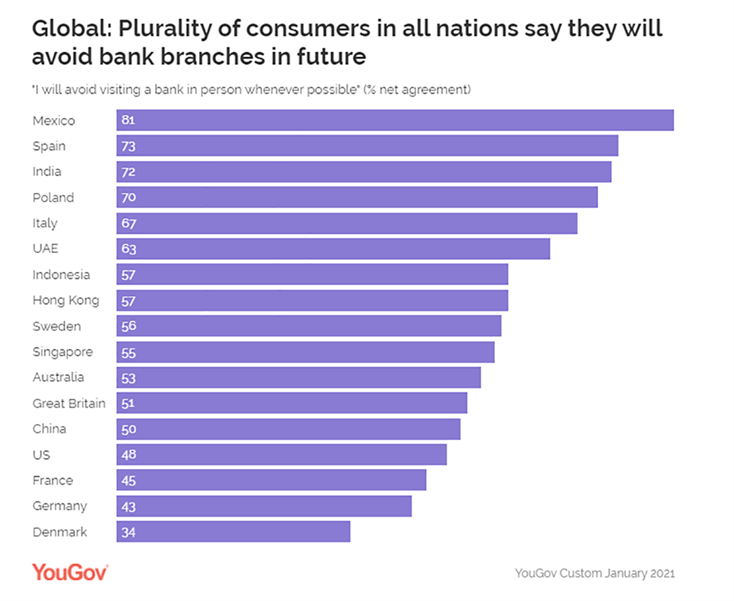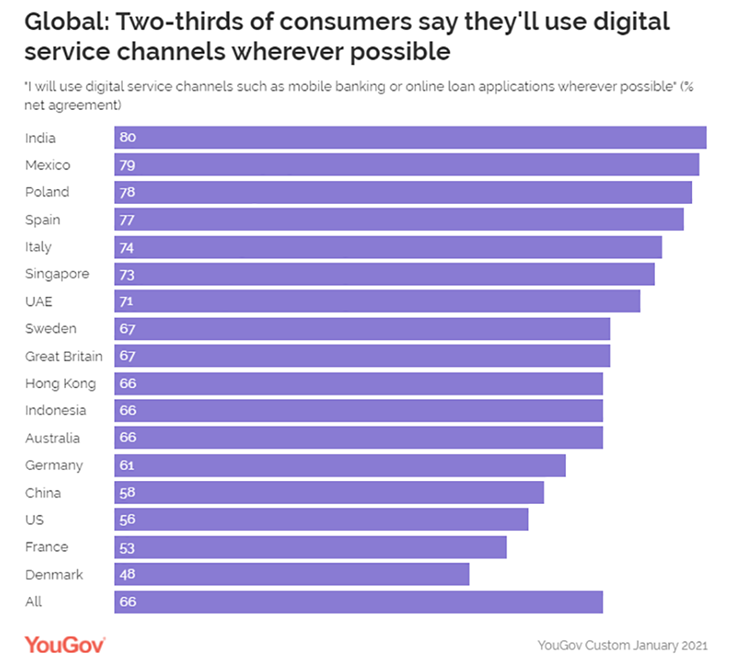Global: How Will Covid-19 Affect the World’s Bank Branches?
International data from YouGov Custom reveals that over half (56%) of consumers say they will avoid bank branches in future thanks to coronavirus.

YouGov data from 17 international markets shows that, on average, a majority of consumers intend to avoid bank branches in future (56%). This varies from market to market, but in every country or territory featured in our study, more agree that they plan to steer clear of physical locations than disagree.
The highest proportion of avoiders can be found in Mexico, where four out of five consumers in our urban - leaning sample say they plan to steer clear of bank branches after the pandemic (81%), and the lowest can be found in Denmark, where just a third say the same (34%). In most cases, half of consumers or more say they intend to forgo visiting their local bank branch.

There are not necessarily clear continental trends here: European countries, for example, feature near the top (Spain 73%; Poland 70% Italy 67%) and the bottom of the table (Denmark 34%; Germany 43%; France 45%). It is a similar situation with APAC and other regions.
The trend is probably not strong enough to pronounce “the death of bank branches” yet. But if many consumers are less positive about physical locations, it’s worth thinking about why.
Our data shows that, for many consumers, concerns about the security of managing finances online have fallen away: in the US, for example, a majority (57%) think it is safe to do so; in Great Britain (74%) this rises to more than seven in ten consumers.
And if lingering negativity towards digital banking has dissolved, it has also been buoyed by positivity towards digital platforms. Two-thirds of consumers across all 17 markets say they prefer these platforms for mobile banking or loan applications wherever it is possible to use them (66%), and in markets like Spain (77%), Poland (78%), Mexico (79%) and India (80%) the proportion rises to more than three-quarters of consumers polled in our study.

In markets such as Great Britain, which has a well-respected fintech scene, branchless “challenger” banks are taking advantage of this tendency and offering digital-only financial services. And while their market share is smaller than that of larger institutions like HSBC and Barclays, the demographic makeup of their audience is revealing.
Looking at Starling Bank and Revolut – two major challengers in the sector - reveals that at least half of their customers (Starling 54%: Revolut 50%) are aged 18-34, compared to just over a third (35%) of the general population.
Again, both brands are considerably smaller than their high street competition – and our data indicates that each could do more to broaden their appeal to female consumers, who are underrepresented next to men – but they have successfully attracted a youthful audience.
By comparison, data from YouGov Profiles shows that people who like visiting their bank branch are a minority, and typically older. Just three in ten say that accessibility of their local branch is a motivation when choosing a bank (29%), only one in ten say it’s a primary motivation (10%), and they’re more likely to belong to the over-55 demographic (47% vs. 38% of the British public).
The data also shows that Brits who say that access to their bank branch is a primary motivation don’t visit it all that frequently in practice: a fifth say they never visit their local branch in person (20%), 12% go less than once a year, another 12% go once every six months, and three in ten visit once every two or three months (29%). Even among Brits who do care about bank branches, the attachment may be more sentimental than practical.
For more insights into the changing global financial services landscape, download YouGov’s Global Banking & Finance Report 2021.